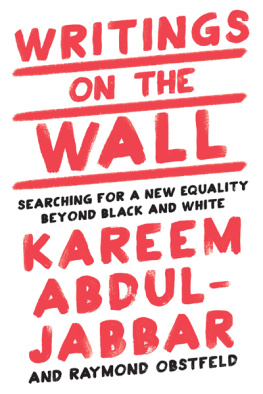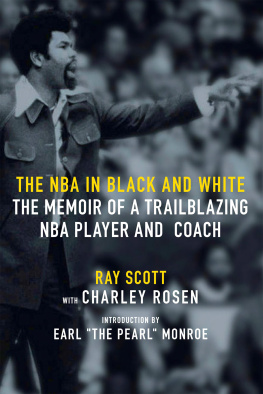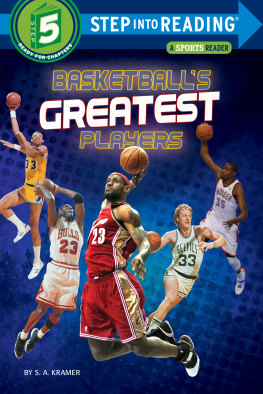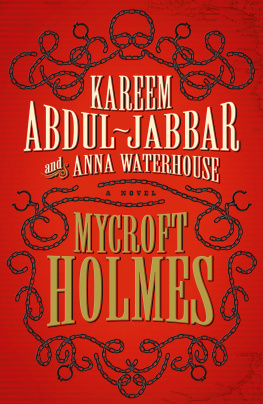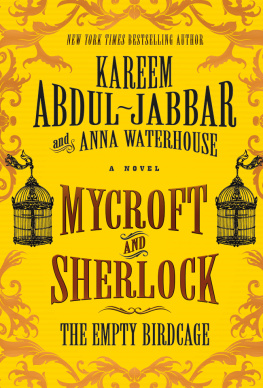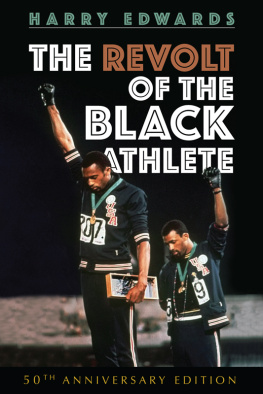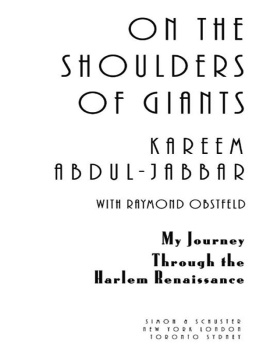TABLE OF CONTENTS

WRITINGS
ON THE
WALL
SEARCHING FOR A NEW EQUALITY BEYOND BLACK AND WHITE
KAREEM
ABDUL
JABBAR
AND RAYMOND OBSTFELD
Introduction
Bridging Troubled Waters
Is a danger to be trusting one another
One will seldom want to do what other wishes
But unless someday somebody trust somebody
Therell be nothing left on earth excepting fishes.
A PUZZLEMENT, THE KING AND I
IVE BEEN ASKED MANY TIMES OVER THE YEARS WHAT PROFESSION I would have chosen had I not become a basketball player. My answer surprises many people: I probably would have become a history teacher. Not just so I could amaze kids with cool historical trivia, like the fact that when Thomas Jefferson was president, he had the bones of a prehistoric mastodon shipped to the White House so he could assemble the skeleton in the East Room. Or that Ben Franklin not only invented the rocking chair but in 1752 helped found one of the Colonies first insurance companies: the Philadelphia Contributionship for the Insuring of Houses from Loss by Fire. Or that George Washington bred hound dogs, which he treated like family, giving them adorable names like True Love and Sweet Lips.
Although I do appreciate History McNuggets like those, my real passion for history is in using it as a critical guide to our future, both personal and cultural. History illuminates the safest path in front of us by revealing the pitfalls of the past. It is a secular bible of cautionary and inspiring stories that distills the wisdom of thousands of years of human endeavor into practical lessons about humanitys morals, politics and personal relationships. It is the ultimate self-help book. And right now, given the political and social turmoil in America, we need all the help we can get.
However, in the hands of the greedy, the power-hungry and the unscrupulous, history is also a powerful tool of mass manipulation. It can be used to herd the unaware into self-destructive choices. History is open to interpretation, of course, but why do so many people fail to recognize the basic patterns, like the fact that oppression leads to revolutions or that war almost always has unintended consequences? Lots of reasons: the negligence of educators failing to teach properly, the malice of politicians anxious to force-feed corrupted versions of the past, the ignorance of individuals too lazy or fearful to seek the truth. Whatever the cause, the result is the same: enslavement without awareness of it.
The consequences of this manipulation can be devastating. For example, before Americas decision to engage in a second war with Iraq, many opponents warned that although such a war could be easily won in the short run, the aftermath would take a heavy toll on America in terms of lost lives, staggering financial costs and bad blood throughout the Middle East that would radicalize many Muslims. These were the costly lessons that could have been learned from our experience in Vietnam. Stanton S. Coerr, a Marine officer and a veteran of the war in Iraq who holds degrees from Duke, Harvard and the Naval War College, wrote on the website The Federalist in 2015, We are losing the war in Iraq for the same reason we lost the war in Vietnam: we are fighting one war, while the insurgents fight another. He explained, The Americans want to leave. The insurgent is staying until he dies or wins. This makes him unstoppable. The question is: How can we make the same mistake only a few decades after the previous one?
I think its because we prefer to ignore our past mistakes rather than learn from them. Thats why so many Americans rejected the comparison between the Vietnam and Iraq invasions and embraced a romanticized revenge-movie mentality in which ass-kicking somehow equals victory. This was a case of pride, politics and ignorance getting the better of reason. Its ignoring history that allows leaders to persuade us to keep repeating such colossal mistakes that our future generations must pay for. One of my favorite movies, The History Boys (2006), is about a group of high school history students in the early 1980s in England. One of their teachers, Mr. Irwin, takes them to a World Wars I and II memorial, a cenotaph, which is an empty monument honoring people whose remains are buried elsewhere. He tells them a startling truth about how war memorials exist not to honor the dead but to make us forget we are responsible for their unnecessary deaths:
The truth was, in 1914, Germany doesnt want war. Yeah, theres an arms race, but its Britain whos leading it. So why does no one admit this? Thats why. [Nodding to war memorial.] The dead. The body count. We still dont like to admit the war was even partly our fault cause so many of our people died. And all the mournings veiled the truth. Its not lest we forget, its lest we remember. You see, thats what all this is aboutthe memorials, the cenotaph, the two minutes silence. Because there is no better way of forgetting something than by commemorating it.
The teachers point is that we often settle for a glorified falsehood in order not to face the harsh truths and then have to do something about them . Its just easier to go with the flow, even if the flow is a current of lies. The unwanted lesson here: most people choose to feel good rather than do good.
What makes some people feel good during times of economic struggle, terrorism and political discord is to be told that their problems can be attributed to particular groups who want to take their jobs, rip them off or attack them. And that the world can be made better and safer by keeping those other people down or keeping them out or keeping closer watch on them. The problem with that kind of thinking is that America was built of waves of those other people struggling for their place in society. Buying into falsehoods and simplistic assumptions about people not like ourselves creates fractures in our society and weakens us. We have too many continental divides today: left versus right, wealthy versus working-class, black versus white, men versus women, young versus old, religion versus religion. With this book, my purpose is to show how many of these conflicts are the result of fear and misunderstanding, often propagated by those looking for political or financial gain. If there is one lesson of history that we would be wise to remember today, its what Abe Lincoln said about a house divided against itself.
Despite Abes warning, we have never been more divided. One reason for this is the insidious ways history is manipulated to marginalize people based on race, creed, gender or other differences, binding them to false versions of themselves and discouraging them from seeing any other possibilities for their future. When I was growing up, my school textbooks were mostly devoid of African Americans in any positive role. They were portrayed as societys pathetic victims or happy-go-lucky simpletons, grateful for whatever scraps they were given, with a smile that said, I got plenty of nuthin, and nuthins plenty for me. The news media werent much kinder. Civil rights leaders were often characterized as well-meaning but misguided because they didnt understand how to be patient and wait their turn. Or, if they were more aggressive in demanding equal rights, they were portrayed as subversives or thugs.
My experiences as a youth growing up in that atmosphere, in which there were few role models deemed acceptable by the general white population, made me examine history much more closely. I wondered why we keep making the same mistakes over and over when we have plenty of voices from the past screaming warnings. That was my main motivation for writing history books that celebrated the achievements and influence of African Americans: On the Shoulders of Giants: My Journey Through the Harlem Renaissance , which details the influence that black artists, writers, musicians and political leaders had in reshaping American culture; Brothers in Arms: The Epic Story of the 761st Tank Battalion, WWIIs Forgotten Heroes , which is a history of an all-black armored unit that served with distinction in Europe; and What Color Is My World? The Lost History of African-American Inventors , which introduces to children the many African-American inventors responsible for the devices they use on a daily basis. This last book was especially rewarding for me because I traveled around the country visiting elementary and middle schools to promote STEM education (science, technology, engineering and math), often meeting various children of color who said, I never thought someone like me could become a scientist, but now I think I can. It doesnt matter whether they actually dojust that they know its an option.
Next page
